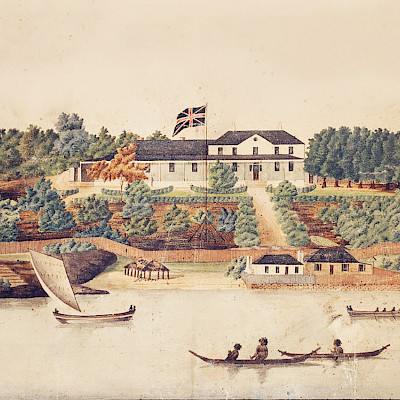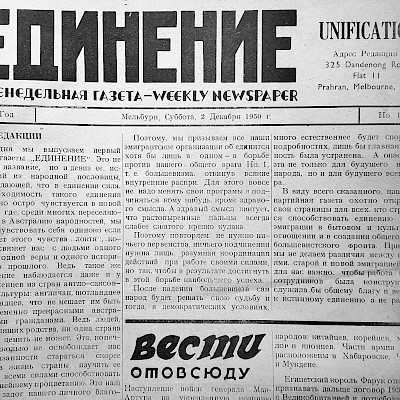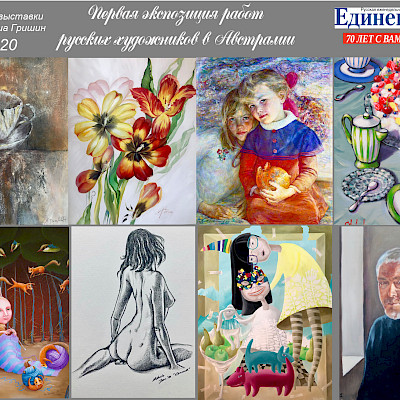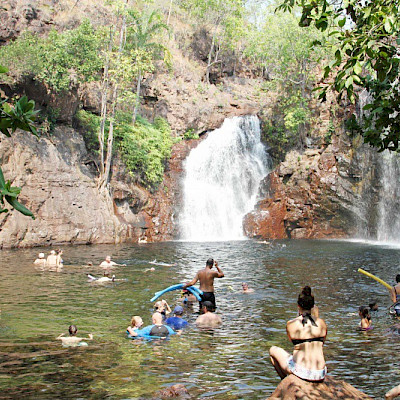Gleb Vladimirovich Berdnikov was one of a group of people who created a Russian newspaper in Australia back in 1950 and became its author. His daughter Elena Kozhevnikova tells about his life.
Gleb Vladimirovich Berdnikov was born in Nikolayevsk-on-Amur where his father, personal nobleman colonel Vladimir Kirillovich Berdnikov was commander of the Chnyrrah fortress. Gleb and his younger brother Alexander were sons of Vladimir Kirillovich’s second marriage, who married Elena Stepanovna Samoylova, daughter of a merchant of the first guild in Blagoveschensk, some years after being widowed. There was one much older son, Boris, from Vladimir Kirillovich’s first marriage. All three sons were enrolled in the Khabarovsk Cadet Corps named for Count Muravyev-Amursky. With the advance of the Red Army into Siberia, the cadets were evacuated by ship along the Amur River to the Far East.
The younger cadets, including Alexander Berdnikov, were put ashore to be temporarily housed in Mukden, while the older ones, including 15-year-old Gleb, were delivered to Shanghai. Gleb had perfect pitch and played three instruments – trumpet, clarinet, and guitar – in the cadets’ orchestra and choir. Much has already been written about how the cadets were exploited during their time in Shanghai: the training officers evacuated with them forced them to play in nightclubs and various entertainments, pocketing the fees and keeping the cadets on short rations. The fate of the cadets took a radical turn when the former supreme commander of the White Army, General Vrangel, attempted to unite the remnants of all pre-revolutionary Russian cadet corps into a new “Crimean Corps” in Yugoslavia. The Berdnikov brothers became members of this corps. According to unofficial sources, their older brother Boris was among the imprisoned White officers drowned on the “death barges” scuppered by the Bolsheviks. Gleb graduated from Belgarde University with a degree in electrical engineering, served the mandatory military service in the Yugoslav army, and married Natalia Vladimirovna Komarova, the younger daughter of Vladimir Pavlovich Komarov, who became the technical editor of the “Edinenie” weekly Russian newspaper in Australia many years later.
Gleb was an ardent disciple of all things beautiful - music, literature, and especially poetry, which was his greatest passion. He was able to recite poems that captured his fancy after just one or two readings. He had a pleasant baritone, and would often be asked to play the guitar at young people’s social gatherings, and sing popular songs of the time, such as the romances of Alexander Vertinsky. Like many other patriotic young men hoping to fight for freedom in Russia, he became a lifelong member of the NTS – the National Labour Union (Solidarists). An unswerving anti-communist Gleb, like many other young men of his generation in exile, refused to join the “Shutskor”, a voluntary paramilitary organization formed under German occupation in Yugoslavia, but joined the Russian Liberation Army (ROA) under General Vlasov, seeing it as a possible (but failed) force to overthrow the Soviet regime.
Like thousands of White refugees of the “first wave”, Gleb and all the members of his extended family had to flee Yugoslavia in the face of the communist offensive and after months of wandering across war-torn Europe ended up in the displaced persons (so-called “DP”) camp of Moenchehof in the American zone of occupied Germany. It was from Germany that the entire family – Gleb with his wife and daughter, in-laws the Komarovs - Vladimir Pavlovich and Maria Yakovlevna- and the Komarovs’ older daughter Irina Halafova with her husband and son, ended up in Australia by the beginning of 1950. Gleb’s brother Alexander chose to emigrate with his family to Brazil.
Gleb settled in Sydney and because he knew English and his diploma was recognized by the Australian authorities, was hired as an engineer on the Snowy Mountains Hydro-Electric Scheme. There were few events in the Russian community in Sydney, be they political, social, cultural or theatrical in which Gleb did not take part, nothing that found no echo in his lively, seeking and warm heart. He presented many public lectures, took a keen part in discussions and disputes, but never offended his interlocutors. He simply loved people and accepted them equally with all their failings and virtues. It is noteworthy that among the very many people who came to his funeral, there were some who did not know him personally, but had attended his lectures and knew about his social activities.
He died tragically in his 51st year. On the morning of the 13th of June 1958, he gave his car in for servicing and travelled to work on public transport. A colleague offered to give him a lift part of the way home at the end of the day. Gleb got out of the car and ran for his bus, which was about to pull out of its stop, and was knocked over by a car, racing from around a corner. The driver was a 16--year-old boy out joyriding in his father’s car. Turing the corner at speed he panicked seeing a pedestrian in his path and hit the accelerator instead of slamming on the brakes. Gleb died 45 minutes later before the ambulance reached the nearest hospital. The Russian Orthodox priest Father Fedor Mikhalyuk, summoned hastily from the Orthodox cathedral in Strathfield, could only read the prayer for the departure of the soul over the body of Gleb Vladimirovich Berdnikov. May the foreign soil lie upon him lightly as a feather.
Helena Kojevnikov, nee Berdnikova

















